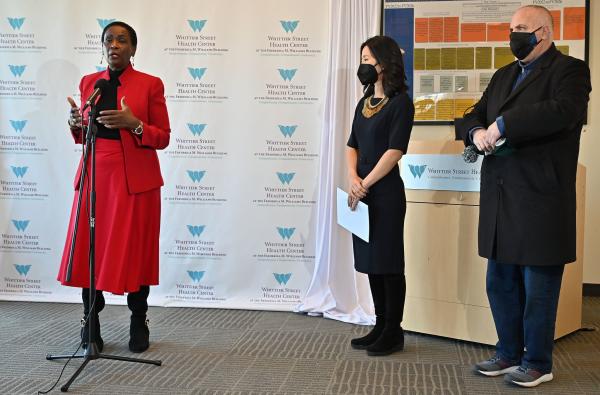February 2, 2022

Frederica Williams, president and CEO Whittier Street Health Center, spoke at a media event to an- nounce the city’s B Together policy on Jan. 15 as Mayor Wu and City Council President Ed Flynn looked on. Isabel Leon photo/Mayor’s Office
Community health centers were started about 50 years ago as an innovation in the medical care system that allowed mainly low-income urban and rural Americans access to primary care providers. When the neighborhoods of Boston lost much of their middle class populations to the suburbs, they also lost the private physicians who followed their patients to the suburbs. Unable to get access to medical care, new city residents turned to emergency rooms for their basic health care needs. This was seen as both a misuse of emergency rooms and bad for any continuity of care.
As a result, here in Dorchester, with the support of hospitals and government, community health centers were built to bring medical providers into the communities that had lost them. Eventually, ten health centers dotted the Dorchester landscape, led by community boards and directors and operating out of storefronts, trailers, and the basements of municipal buildings.
Over the past 50 years, Dorchester’s health centers, now eight in number, have become major providers of clinical care for the majority of Dorchester residents. They are large institutions with multi-million dollar budgets in state-of-the-art facilities with hundreds of employees that have developed comprehensive clinical and preventive services and adopted the latest innovations and technology and demonstrated excellence in clinical care.
Beginning two years ago, health centers have been tested by the Covid-19 pandemic hit. They have performed extraordinarily well, adjusting systems of care to accommodate thousands of Covid patients, adjusting again when tests became available, then again when the vaccines were introduced.
As we enter Year 3 of Covid, I have been discussing the lessons learned and plans for the future with some health center leaders who are very appreciative of their staffs for their ability to change systems of care quickly, and of state government for adjusting systems to allow the health centers to maintain financial stability while the clinics quickly adjusted all their systems for Covid.
The general sense is that the coronavirus will be declared “endemic” soon. Endemic means that Covid will continue to be here, but that it will be largely under control because most people, through vaccines, will be at low risk for hospitalization or death, and there are and will be treatments that will lower the death rate for those who get the disease.
So where does that leave the health centers? Chuck Jones, CEO of Harbor Health, discussed the importance of learning from our Covid experience to be better prepared the next time, saying that the health care system needs a “more nimble response process” to ensure that appropriate services and staffing can be made available more quickly. He added that “we had to make decisions quickly that were good for the circumstances, which opened the eyes of management on what could be accomplished.”
Dr. Renee Crichlow, chief medical officer at Codman Square Health Center, is focused on building the health center’s capacity for “the foundational needs of the community for health care, and a chronic care system for Covid. We need to shape the future so the community is not just safe, but also thriving.” She added: “Covid is still here, but when it has been put in our ancestral memory in a few years, vaccination will continue to help decrease severe Covid, and Covid may eventually have better treatments than we currently use to treat flu.”
Whittier Street Health Center CEO Frederica Williams noted that Covid has caused additional health care problems that Whittier is focused on, including ensuring care for patients with pre-existing health conditions and for people who have delayed care. “We are seeing increased rates of mental health issues in children, increased substance use disorders, and gaps in wellness and prevention.” Williams sees the need for education of community residents so that vaccination rates can increase. Whittier Street has been holding community focus groups to learn how to best engage the community.
Jones discussed balancing the needs of the thousands of patients with chronic disease with the demands of Covid treatment, pointing out the need for education efforts for both patients and staff.
Crichlow said her “biggest lesson” of the pandemic was “realizing that the most important thing we can do is to create a unified view of community.” She said that our country’s “polarization has prolonged the pandemic,” and that we need to build “trust in public health and science. The public needs to understand how science works,” and that “as data changes, science is moving toward doing the next best thing.”
Williams pointed to the need “for many community partnerships to work together to achieve health equity,” and to support the community’s efforts to organize itself. Jones and Williams both mentioned that the Commonwealth had recently recognized the necessity of investing in community health centers by passing a $125 million increase in rates. This will help ensure that health centers, which have performed so well in meeting community need during the pandemic, can be sustained and prepared for the next phase of Covid and to innovate when the next health crisis comes.
Bill Walczak is the founding president and former CEO of the Codman Square Health Center.


